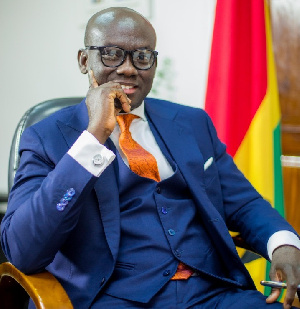The Supreme Court of Norway has, in a unanimous preliminary determination by a panel of three (3), refused to grant leave to appeal to Messrs. Jongsbru AS, party to a judgment of the Norway Court of Appeal previously given in favour of the Government of Ghana on November 2, 2022.
The decision by the Norway Supreme Court refusing the grant of leave to appeal, under Norwegian civil procedure, is final and not subject to review by the Supreme Court as fully constituted by a panel of five (5) or by any court.
It completely brings an end to the litigation over the purchase of a property previously identified by the Republic of Ghana for use as a chancery building in Oslo.
By this latest decision from the Supreme Court of Norway, the earlier ruling by the Oslo Court of Appeal – (1) fully acquitting Ghana of Jongsbru’s claim and (2) obligating Jongsbru to pay Ghana compensation for legal costs before the District (High) Court and the Court of Appeal with a total of Two Million, Five Hundred Thousand Norwegian Kroners (NOK 2,500,000.00) (at today’s exchange rate approximately USD 250, 000) – is final.
The Norway Supreme Court’s determination of Jongsbru’s attempt to appeal the judgment was made without the parties appearing before the court. In view of the summary determination of this appeal by the Supreme Court, the court further ordered Jongsbru to compensate Ghana nominal legal costs before the Supreme Court in the sum of NOK 18 750 (equals at today’s exchange rate approximately USD 1 871). This is a fixed rate applied in such summary proceedings before the Supreme Court of Norway.
Ghana’s Attorney-General, Godfred Yeboah Dame, expressed utmost satisfaction with the decision of the Norway Supreme Court not to allow the appeal against the judgement of the Court of Appeal.
Mr. Dame expressed greater delight at the conclusion of this dispute in a foreign court which had raged on for the past four years travelling the full length of the architecture of Superior Courts in Norway, and indicated that all costs awarded in favour of Ghana still outstanding would be immediately paid by the losing party in accordance with Norwegian civil procedure to mitigate expenses incurred in defending the interests of Ghana across all the courts, which involved the travel of the Attorney-General and witnesses from Ghana’s Ministries of Foreign Affairs and Finance for all the hearings in the other courts.
It would be recalled that following the dismissal by the Court of Appeal of Jongsbru’s earlier appeal filed by Jongsbru, Mr. Dame had explained that, under Norwegian civil procedure rules, any civil judgment of the Court of Appeal may be appealed to the Supreme Court but the hearing of that appeal is not as of right.
A panel of 3 Supreme Court judges had to first determine whether to allow the appeal to be heard by the Supreme Court and explicitly allow for same to be heard, before the Supreme Court would proceed to hear and give a judgment on it. If the panel does not allow the appeal to be heard, the appeal terminates without any further processes at the Supreme Court.
The ground on which the Norwegian Supreme Court will hear an appeal is where a new or major issue of law is raised in the matter, and the court feels obligated to give legal clarity on the position. The Norway Supreme Court does not hear an appeal on matters concerning the facts or evidence in a civil matter.
In this attempt to appeal, Jongsbru had contended that the reasoning by the Court of Appeal in its judgment was too short, vague, unclear and contained deficiencies which rendered a proper appeal on the merits impossible and therefore, the judgment had to be “repealed”.
An application for a judgment to be repealed, in Norwegian law, is similar to a request to set aside the judgment.
Background
Facts of case
In 2018, Ghana decided to establish an embassy in Norway. The acquisition of a chancery building, either by purchase or by a lease, was deemed to be critical to the establishment of the embassy.
A delegation from Ghana identified a number of properties, including Sigyns Gate 3 at Frogner in Oslo, the property the subject matter of the litigation. On 22nd November 2018, Ghana received an offer from Jongsbru to buy the property for 100 million Norwegian Kronner. The offer had a deadline of seven days, i.e. by 29th November, 2018. On 29th November 2018, Ghana’s Charge d’Affaires, Regina Appiah-Sam, responded to Jongsrbu’s offer in these terms:
“On behalf of the Government of Ghana, Ministry of Foreign Affairs, we have the pleasure to accept the Offer with the following conditions:
1. … It is a condition for the acceptance of the Offer and the final contract, that the building is without significant defects and that the renovation work is completed and performed in a satisfactory manner.
2. Before take-over there is a final approval without conditions from relevant authorities for the use of the property as an Embassy.
3. Agreement on a final contract of sale. We accept that the contract shall be based on the Sem & Johnsen standard contract.”
Subsequent to due certification by Ghana’s appointed valuers that the building was without significant defects and that the renovation works on same had been completed and performed in a satisfactory manner, Ghana pulled out of the transaction on various grounds, including a failure on the part of the sellers to satisfy the condition of a final approval from the relevant Municipal authorities in Oslo for the use of the property as an Embassy.
The sellers of the property, Jongsbru AS, sued the Government of Ghana in the Oslo District Court claiming sums totalling about seventy-eight million Norwegian Kroner for breach of contract, loss of profits, interest and costs of litigation.
Original judgment of the District Court (High Court)
On 16th December 2021, the Oslo High Court upheld Ghana’s contention that on the issue of choice of law, the competence or legal capacity of Ghanaian officials to bind the Republic of Ghana must be decided according to Ghana law. Whereas the Government of Ghana had led evidence by the Director of the Legal Directorate of the Ministry of Finance to prove the content of Ghana’s financial and procurement laws, no attempt was made by the plaintiff to rebut same.
The Court found that Ghana’s Minister for Foreign Affairs, in accordance with section 20 of the State Property and Contracts Act of 1960, had the competence to bind Ghana in agreements involving her ministry.
This authority had not been exercised in the transaction in question. Neither the Charge d’Affaires of Ghana at the time, Mrs. Appiah-Sam nor Ghana’s lawyer, Mikkel Visllie had authority to enter into the agreement on behalf of Ghana. There was thus no valid or binding agreement between the sellers of the property and Ghana.
The Court further held that under Ghana law, the Public Procurement Authority must agree on the purchase of the property and the application of funds must also be approved by the Minister for Finance, before the Minister for Foreign Affairs must either personally execute the agreement for the purchase of the property or authorise another competent person by a power of attorney to execute the agreement. On the evidence provided by Ghana’s witnesses, this had not been done.
Regarding the claim against Ghana’s lawyer at the time of the purported sale, the Court found that the lawyer was fully responsible for the positive contractual interest in accordance with the Contracts Act of Norway. The Court was of the view that there is a particular reason for trusting lawyers who act on behalf of clients.
The Court found that the lawyer did not have any reasonable excuse for not ensuring that there was a power of attorney signed by Ghana before purporting to convey acceptance of the offer by Jongsbru. The Court thus ordered lawyer Mikkel Vislie who acted for Ghana and his insurance company, Tryg Forsikring to pay to Jongsbru the sum of thirty-seven million, seven hundred and twelve thousand, nine hundred and four Norwegian Kronner as compensation.
Appeal hearing
The Oslo Court of Appeal heard the appeal over four days – from 25th to 28th October, 2022, taking evidence from the witnesses of all the parties in the matter afresh. The hearing was observed by students of the Oslo Law School as part of their practical advocacy training.
Ghana’s Attorney-General, Mr. Godfred Yeboah Dame, led a team from Ghana for the hearing. Mrs. Jennifer Lartey, Ghana’s ambassador to Norway, Mrs Regina Appiah-Sam, Charge d’Affairs at the time the embassy was opened, Charles Osei-Marfo of the Oslo mission, Ms. Doris Brese, Ministry of Foreign Affairs and Mrs. Mangowa Ghanney, former Director, Legal at the Ministry of Foreign Affairs, testified as witnesses for Ghana.
Judgment of the Oslo Court of Appeal
The Oslo Court of Appeal dismissed the appellant’s case in its entirety as unfounded and ordered to pay to Ghana 1.5 Million Norwegian Kroner (approximately 150 000 USD) as compensation for procedural costs incurred before the Court of Appeal. It further ordered Jongsbru to pay to Ghana 1 Million Norwegian Kroner (approximately 100 000 USD) for procedural costs incurred before the Oslo District Court.
The Court of Appeal observed that a prerequisite for the appellant’s claim was that the company had incurred economic loss as a result of Ghana’s decision not to finalize the sale. The appellant did not incur any such economic loss. On a proper application of the principles of offer and acceptance, Ghana could have withdrawn from the agreement (even if it was binding), as all conditions necessary for the performance of the contract had not been satisfied.
Regarding Ghana’s defence about a lack of approval by the Oslo Municipal authorities for the building to be used for an embassy, the Appeal Court found that based on the evidence presented by Ghana concerning the appellant’s belated attempts to apply for the said permission and the municipality’s responses, it was clearly established that no such permission would have been received by the relevant date for the contract to take effect, and therefore Ghana could have withdrawn from the agreement. The purchase would in no case have materialised, and the appellant would not have received the purchase price from Ghana, for a claim of economic loss to be validly asserted.
The Oslo Appeal Court noted further, that, the condition regarding authorization by the municipal permission to use the property as chancery, was vital to the purchase, and that, only Jongsbru, not Ghana, had any control over whether the condition would be met or not. Further, the consequences of the condition not being met, was set out specifically in the agreement.
The Attorney-General and Minister for Justice expressed satisfaction with the outcome of the appeal and hoped that it would mark the end of the dispute. Mr. Dame explained that, under Norwegian civil procedure rules, any civil judgment of the Court of Appeal may be appealed to the Supreme Court but the hearing of the appeal is not as of right.
A panel of three Supreme Court judges must first determine whether to allow the appeal to be heard by the Norway Supreme Court and explicitly allow same to be heard, before the court will be required to consider or hear it and then proceed to give a judgment on it.
“If the panel does not allow the appeal to be heard, the appeal terminates without any further processes at the Supreme Court. The ground on which the Norwegian Supreme Court will hear an appeal is where a new and major issue of law is raised in the matter and the court feels obligated to give legal clarity on the position. The Norway Supreme Court does not hear an appeal on matters concerning the facts or evidence in a civil matter,” Dame concluded.
 Home Of Ghana News Ghana News, Entertainment And More
Home Of Ghana News Ghana News, Entertainment And More





